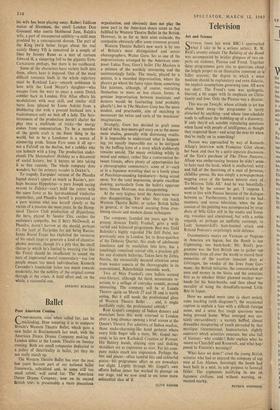Television
Art and Science
SEVERAL lifne6 last week BBC-1 approached what I take to be a serious subject. R. W. Reid's seventy-minute The Building of the Bomb was accompanied by briefer glimpses of two ex- perts on violence, Picasso and Freud. Together these programmes gave rise to questions about the length proper to an illustrative comment or a fuller account, the degree to which a mass medium should be explanatory and even didactic, the implicit assumptions governing tone. All were too short. The Freud's tone was apologetic, blurred, a bit soppy with its emphasis on Chris- tianity and love. Only the Picasso was a disaster.
This was on Tonight, whose attitude to art has often been smug—the programme is rarely disturbed by anything—and whose time-schedule tends to suffocate the bubbling-up of a discovery. If only they'd ask sensible stimulating questions when faced with people of intelligence, as though they respected them—and scrap the next bit when, they're really on to something!
Picasso was approached by way of Kenneth Allsop's interview with Francoise Gilot about , her book and then by a quite separate discussion of the Tate's purchase of The Three Dancers. „ Allsop was embarrassing because he didn't seem. to have read the book, which is intellectual, witty and full of the theorising of a man of tierverse, childlike genius. He was simply a newspaperman, nagging away at the human interest story of 'Ex-Mistress Tells All.' And he was beautifully snubbed by the answer he got, 'I suppose I went to live with Picasso because of the dialogue. between us.' Furthermore, it seemed to me bad. manners, and worse television, when the dis,, cussion of the painting was accompanied by stray shots of Mlle Gilot still in 'the studio and listen, ing, voiceless and abandoned, but with a noble anguish, or perhaps an ineffable contempt, to Lady Summerskill's ham-handed attack and Roland Penrose's surprisingly mild defence.
Documentary essays on Vietnam or Negroes in America are legion, but the Bomb is too frightening, too hush-hush; Mr. Reid's pro.' gramme was the first British one to gather top physicists from all over the world to record their memories of the carefree innocent days at GOttingen, the exodus of the Jews from Ger, ' many, the British initiative, the concentration of men and money in the States and the anxieties, first as to whether Hitler planned nuclear war- -heads for his buzz-bombs, and then about the morality of using the dreadfully-named Little Boy in Japan.,
Here we needed more time (a short series), some teaching (with diagrams?), the occasional caption to explain a face with a difficult foreign name, and a sense that tough questions were being pressed home. What emerged was cer- tainly extraordinary: a warmly baffled, almost dreamlike recapturing of youth pervaded by that mystique (international, humanitarian, slightly superior) which scientists emanate, but also full of hiatuses---why couldn't Bohr explain what he meant to Churchill and Roosevelt, and what hap- pened to Einstein's warnings?
'What have we done?' cried the young British scientist who had so enjoyed the company of top men at Los Alamos. Seemingly the bomb had been built in a mist, its sole purpose to forestall , Hitler. The arguments justifying its use on Japanese civilians, and without warning, re- mained murky.
PATRICK ANDERSON,


































 Previous page
Previous page